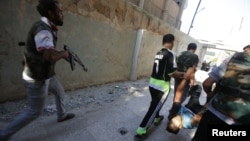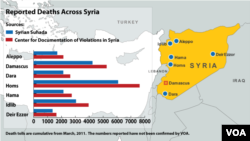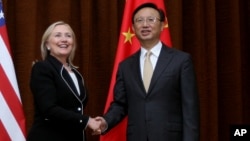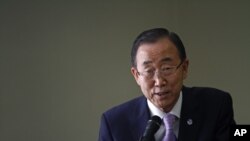Activists say Syrian forces have killed at least 19 people, including seven children, when they shelled rebel-controlled areas of the commercial capital, Aleppo.
The Britain-based Syrian Observatory for Human Rights said Wednesday that 10 civilians were killed in the southern neighborhood of Bustan al-Qasr while a total of nine bodies, including those of the children, were found in the Marjeh and Hanano areas.
Other opposition groups said the death toll in the strategic northern city was as high as 43, including women and children. VOA cannot confirm events on the ground in Syria because the government severely restricts access for international journalists.
Rebel fighters on July 20 opened a new front in the Syrian conflict by launching an attack on Aleppo. The army has since dislodged them from several sectors, including one of their main strongholds Salaheddin, but pockets of resistance remain.
Diplomacy
Also Wednesday, talks between U.S. Secretary of State Hillary Clinton and Chinese leaders failed to narrow gaps on how to end the crisis in Syria. Chinese Foreign Minister Yang Jiechi said Beijing backs a "political transition" in Syria to end worsening bloodshed after 18 months of unrest, but repeated China's opposition to forceful foreign intervention in the crisis.
Comments from Clinton and Yang showed the countries remain deeply divided on those issues, although both maintained they are committed to working together despite their differences.
The United States and other countries are upset that China and Russia have repeatedly used their veto powers in the U.N. Security Council to block actions that could have led to sanctions against Syrian President Bashar al-Assad's government. China says Syria's civil war needs to be resolved through negotiations and not outside pressure.
Yang told a news conference with Clinton in Beijing Wednesday that "history will judge that China's position on the Syria question is a promotion of the appropriate handling of the situation."
Clinton acknowledged it is "no secret" the U.S. government is disappointed by Chinese and Russian policy on Syria and repeated that the best course of action remains tough U.N. Security Council measures.
Weapons
In New York Tuesday, United Nations Secretary-General Ban Ki-moon urged governments to stop sending weapons to Syria, saying they are only adding to the misery. Ban told the General Assembly that arming Syrian soldiers and the rebels adds to the risk of unintended consequences as the fighting spreads.
Russia has been a long-time supplier of weapons to the Syrian government while Qatar, Saudi Arabia and Turkey have sent arms to the opposition.
Ban also said the humanitarian situation in Syrian is grave and getting worse. Ban told the diplomats that U.N. efforts to help Syrian refugees are badly underfunded, with only half the money needed contributed so far.
Jordan, Iraq, Lebanon and Turkey have opened their borders to camps for Syrian refugees. Ban said these governments have been generous and urgently need more support.
The United Nations says 100,000 Syrians fled the country in August, the highest monthly total since the conflict began last year. U.N. refugee agency spokeswoman Melissa Fleming says 235,000 Syrians live in refugee camps. But officials say the true number of refugees may be much higher because not everyone has registered with camp authorities.
Photo Gallery: Latest Images from Syria
Timeline: Syrian Conflict
The Britain-based Syrian Observatory for Human Rights said Wednesday that 10 civilians were killed in the southern neighborhood of Bustan al-Qasr while a total of nine bodies, including those of the children, were found in the Marjeh and Hanano areas.
Other opposition groups said the death toll in the strategic northern city was as high as 43, including women and children. VOA cannot confirm events on the ground in Syria because the government severely restricts access for international journalists.
Rebel fighters on July 20 opened a new front in the Syrian conflict by launching an attack on Aleppo. The army has since dislodged them from several sectors, including one of their main strongholds Salaheddin, but pockets of resistance remain.
Diplomacy
Also Wednesday, talks between U.S. Secretary of State Hillary Clinton and Chinese leaders failed to narrow gaps on how to end the crisis in Syria. Chinese Foreign Minister Yang Jiechi said Beijing backs a "political transition" in Syria to end worsening bloodshed after 18 months of unrest, but repeated China's opposition to forceful foreign intervention in the crisis.
Comments from Clinton and Yang showed the countries remain deeply divided on those issues, although both maintained they are committed to working together despite their differences.
The United States and other countries are upset that China and Russia have repeatedly used their veto powers in the U.N. Security Council to block actions that could have led to sanctions against Syrian President Bashar al-Assad's government. China says Syria's civil war needs to be resolved through negotiations and not outside pressure.
Yang told a news conference with Clinton in Beijing Wednesday that "history will judge that China's position on the Syria question is a promotion of the appropriate handling of the situation."
Clinton acknowledged it is "no secret" the U.S. government is disappointed by Chinese and Russian policy on Syria and repeated that the best course of action remains tough U.N. Security Council measures.
Weapons
In New York Tuesday, United Nations Secretary-General Ban Ki-moon urged governments to stop sending weapons to Syria, saying they are only adding to the misery. Ban told the General Assembly that arming Syrian soldiers and the rebels adds to the risk of unintended consequences as the fighting spreads.
Russia has been a long-time supplier of weapons to the Syrian government while Qatar, Saudi Arabia and Turkey have sent arms to the opposition.
Ban also said the humanitarian situation in Syrian is grave and getting worse. Ban told the diplomats that U.N. efforts to help Syrian refugees are badly underfunded, with only half the money needed contributed so far.
Jordan, Iraq, Lebanon and Turkey have opened their borders to camps for Syrian refugees. Ban said these governments have been generous and urgently need more support.
The United Nations says 100,000 Syrians fled the country in August, the highest monthly total since the conflict began last year. U.N. refugee agency spokeswoman Melissa Fleming says 235,000 Syrians live in refugee camps. But officials say the true number of refugees may be much higher because not everyone has registered with camp authorities.
Photo Gallery: Latest Images from Syria
Timeline: Syrian Conflict
Loading...









